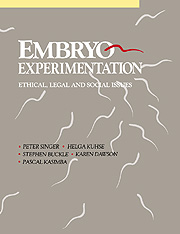Book contents
- Frontmatter
- Contents
- Foreword
- ACKNOWLEDGEMENTS
- INTRODUCTION
- PART 1 THE SCIENTIFIC ISSUES
- PART 2 THE ETHICAL ISSUES
- ARGUMENTS ABOUT THE STATUS OF DIFFERENT DEVELOPMENTAL STAGES
- 5 Fertilization and moral status: A scientific perspective
- 6 Segmentation and moral status: A scientific perspective
- 7 Individuals, humans and persons: The issue of moral status
- ARGUMENTS FROM POTENTIAL
- EMBRYO RESEARCH AND WOMEN
- PART 3 CONTROLLING EMBRYO EXPERIMENTATION IN A DEMOCRATIC SOCIETY
- FORMING A PUBLIC POLICY
- LEGISLATION AND ITS PROBLEMS
- APPENDICES
- GLOSSARY
- NOTES ON CONTRIBUTORS
- INDEX
6 - Segmentation and moral status: A scientific perspective
Published online by Cambridge University Press: 05 June 2012
- Frontmatter
- Contents
- Foreword
- ACKNOWLEDGEMENTS
- INTRODUCTION
- PART 1 THE SCIENTIFIC ISSUES
- PART 2 THE ETHICAL ISSUES
- ARGUMENTS ABOUT THE STATUS OF DIFFERENT DEVELOPMENTAL STAGES
- 5 Fertilization and moral status: A scientific perspective
- 6 Segmentation and moral status: A scientific perspective
- 7 Individuals, humans and persons: The issue of moral status
- ARGUMENTS FROM POTENTIAL
- EMBRYO RESEARCH AND WOMEN
- PART 3 CONTROLLING EMBRYO EXPERIMENTATION IN A DEMOCRATIC SOCIETY
- FORMING A PUBLIC POLICY
- LEGISLATION AND ITS PROBLEMS
- APPENDICES
- GLOSSARY
- NOTES ON CONTRIBUTORS
- INDEX
Summary
The landmarks in development claimed as determinants of the moral status of the prenate during the abortion debate range from fertilization to birth. In the debate about human embryo research, however, the landmarks in development most highlighted as determinants of moral status are those which occur very early. The present state of IVF technology can only sustain growth of the very early human prenate in vitro. As a result, most present embryo research entails the study of fertilization and early cleavage divisions of the zygote.
This emphasis on the very early stages of human development is also evident in reports from several government inquiries established to devise recommendations for the regulation of embryo research. Such inquiries have occurred in several countries, prompted by the concern generated by the use of the human prenate in research. Although no report has recommended that research using the in vitro human prenate be permitted beyond 14 days after fertilization, differences among the various inquiries indicate that there is as yet no single landmark in development generally accepted as determining moral status.
Committees which have recommended that legislation be introduced to outlaw all non-therapeutic, or destructive, prenate research subscribe to the view that fertilization determines moral status: from the time of zygote formation at the end of fertilization the prenate acquires a right to life and cannot ethically be destroyed. Other committees, which have recommended that research be permitted for up to 14 days after fertilization, see moral status as being acquired later in development.
- Type
- Chapter
- Information
- Embryo Experimentation , pp. 53 - 64Publisher: Cambridge University PressPrint publication year: 1990
- 5
- Cited by



